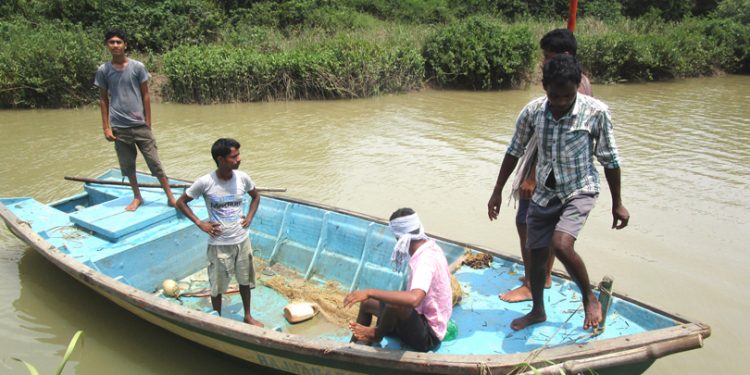Kendrapara: Even as the district administration and the forest authorities are yet to clear the Bhitarkanika National Park of illegal prawn gheries, the latest farming of Roopchand fish has posed an added threat to the ecosystem of the sanctuary, a report said.
Roopchand, which is also known as Pacu or Pomfret, is a seawater fish of Piranha family and is a delicacy among fish lovers. It is known as Roopchandi in local parlance and is easy to eat as its body consists of a single bone.
The fish is found in Atlantic, Indian and Pacific oceans and have flat bodies and deeply forked tails.
However, its consumption has increased as the fish maintains a low scale on fats and calories thus help our body from aging by reducing any such symptoms.
It also helps in reducing risk of heart problems and control blood pressure as Roopchand is a reliable source of omega-3 fatty acids. However, being a predatory and aggressive carnivorous fish it poses serious threat to the eco-system.
It may compete with native species for food and other resources and will eventually lead to the decline or may even wipe out many native fish and other marine creature in the river system.
The fish which remains in groups can easily gobble up the food of newborn crocodiles and other marine creature. The fish’s teeth having resemblance to human can devour the whole carcass of a cattle within few minutes, life science researcher Devi Prasad Sahu, said.
However, notwithstanding the threat, cultivation of Roopchand has increased in the river, creeks and canals in the Bhitarkanika National Park.
Environmentalists have warned that while the mushrooming of prawn gheries has posed serious threat to the survival of Bhitarakanika, the sharp rise in Roopchand fish cultivation will wipe out the eco-system in the sanctuary.
The toxic waste discharged from the prawn gheries is destroying the jungle, lands and water bodies in the sanctuary. Resident Ashok Kumar Samal of Rajnagar said mushrooming of prawn gheries and Roopchand fish cultivation in the water bodies in reserve forest areas during last five year has led to the destruction of the environment.
The long dense forests filled with various wildlife and birds and the serene atmosphere of the coastlines attracts the tourists to Bhitarkanika.
Moreover, the Gahirmatha nesting site of Olive Ridleys , salt water crocodiles and dolphins also attract the tourists, nature lovers and researchers to Bhitarkanika.
However, the sanctuary is slowly slipping into the hands of the unscrupulous fish traders due to mushrooming of prawn gheries and Roopchand fish cultivation which is from Piranha family.
Pratap Padhi, a social activist, said several public interest litigations have been filed in the Orissa High Court praying for demolition of prawn gheries inside the sanctuary.
Recently, amicus curiae Mohit Agarwal accompanying a threemember committee to conduct a probe into the deaths of Olive Ridleys noticed mushrooming of prawn gheries and directed for its eviction.
Environmentalist Sunil Kumar Gantayat said the immigrants are responsible for the destruction of the environment in Bhitarkanika. They have forcibly acquired the forest land in the Bhitarkanika and established prawn gheries and fish farming. They are also cutting down trees and hunting wild animals and birds in the sanctuary.
However, hardly any action is taken against them as they have become the vote banks of the political leaders. He apprehended that Bhitarakanika will be robbed of its charm if action is not taken against the immigrants.
When contacted, DFO Bikash Ranjan Dash said prawn gheries are being demolished with the help of the district administration and the police.
PNN






































